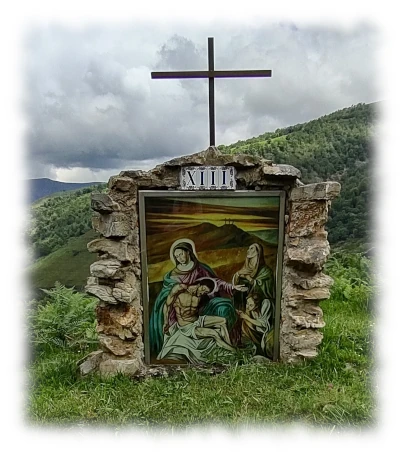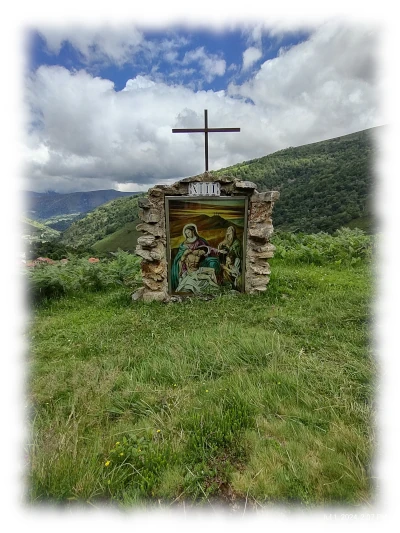- Rosary
- Station Options
- Garabandal Stations
- Station 13
Garabandal Station 13
As I approach Garabandal Station 13, I realize the sacrifice that Jesus has done for me and the deep grief I have experienced so far walking and contemplating His passion. Let's continue to explore the significance of this station and its spiritual implications for believers.
As they take down Jesus from the cross, they place Jesus into the arms of His mother. This moment is often referred to as the "Pietà," which means "pity" or "compassion." Mary's deep grief and unwavering faith make her a model of compassion and fortitude for all believers.
Jesus is taken down from the Cross

San Sabastian de Garabandal Station 13
V. We adore you, O Christ,
and we bless you.
R. Because by your holy Cross,
you have redeemed the world.
Joseph, Nicodemus and John
Joseph of Arimathea a member of the Jewish council and Nicodemus, a Pharisee both kept belief in Jesus' quiet because of their positions. And here they are at the end despite the risks Joseph requesting Jesus' body from Pilate and Nicodemus presence at this station shows his transformation from a secret follower to a public disciple. Both these men show us that faith can grow and develop over time, leading us to take bold steps in our spiritual journey.
John has always been devoted and loyal to Jesus. He is a faithful witness who remained with Jesus until the end, showing examples of a true disciple and having deep bonds of friendship that can help us through times of sorrow.
Joseph and Nicodemus taking Jesus down from the cross and then preparing His body for burial is an act of love and reverence. Both men show respect and dignity and the importance of caring for the dead, as well as the significance of the rituals and customs that provide comfort and closure.

Prayer
My beloved Jesus, it was not the cross, but my sins which have made Thee suffer so much. By the merits of this first fall, save me from the great misfortune of ever falling into mortal sin.
The Way of the Cross of Saint Alphonsus Liquori
Our Father...
Hail Mary...
Glory Be...
v. Have Mercy upon us O Lord.
r. Have Mercy on us.
May the souls of the faithful departed, through the mercy of God, rest in peace.

Ponder
What does the presence of Mary at this station teach us about compassion and strength in the face of suffering?
Mary's faith and compassion is an example of our role of suffering in our own spiritual journeys. We can support other who are experiencing grief and sorrow. Each of us at some point in our life experience losses that shakes us to the bone.
This station encourages us to turn to Mary as a source of comfort and intercession, knowing that she understands our pain and walks with us in our sorrow.
Courage
For me as I contemplate Garabandal Station 13, I realize the extreme importance of two men that are here. Nicodemus and Joseph of Arimathea both kept their belief hidden from the rest of the world. They were not present at any of His healings. Oh yes, they heard of them through the worry of status from their groups they belong to.
Their courage to step forward now is extraordinary these men were in a high position in their synagogue. Today this may mean a Bishop or Cardinal would they risk these positions for a truth? I think the message here is; to stand fast in your faith regardless of position, this includes lay people in positions of power.
There are plenty of spiritual books to read to deepen our understanding and faith on this subject. A few come to mind "The Imitation of Christ" by Thomas à Kempis and "The Way of the Cross" by Fulton J. Sheen or maybe "The Reed of God" by Caryll Houselander It offers insights into how suffering can be a means of participating in Christ's redemptive work.
Ideas for Meditation and Contemplative
Imaginative Meditation: Close your eyes and imagine yourself at the foot of the cross. Visualize the scene: the sorrow of Mary, the presence of Joseph of Arimathea and Nicodemus, and the lifeless body of Jesus. Allow yourself to feel the emotions of the moment and reflect on the depth of Jesus' sacrifice.
Scriptural Meditation: Read the Gospel accounts of Jesus being taken down from the cross (John 19:38-42). Reflect on the words and actions of the key figures in the scene. Consider how their actions and emotions can inspire your own spiritual journey.
Lectio Divina: Practice the ancient Christian practice of Lectio Divina, which involves reading, meditating, praying, and contemplating a passage of Scripture. Choose a passage related to the 13th Station, such as John 19:38-42, and spend time in prayerful reflection on its meaning and application to your life.
Contemplative Prayer: Sit in silence and simply be present with the scene of Garabandal Station 13. Allow yourself to be open to the presence of God and to receive any insights or emotions that arise. This form of prayer can help you connect more deeply with the mystery of Christ's suffering and death.
Contemplation Ideas
Reflect on Mary's Sorrow: Contemplate the profound grief of Mary as she cradles the lifeless body of her Son. Consider how her sorrow can inspire you to be more compassionate and supportive of those who are suffering in your own life.
Joseph of Arimathea's Courage: Reflect on the courage of Joseph of Arimathea, who risked his reputation and safety to honor Jesus with a proper burial. Think about how you can show similar courage in your own life, standing up for what is right and just, even when it is difficult.
Nicodemus' Transformation: Contemplate the transformation of Nicodemus, who went from being a secret follower of Jesus to openly participating in His burial. Reflect on your own spiritual journey and how you can grow in faith and commitment to Christ.
The Humanity of Jesus: Meditate on the humanity of Jesus as He is taken down from the cross. Reflect on how His suffering and death are a testament to His love for humanity. Consider how you can respond to His love with gratitude and a deeper commitment to living out your faith.
